Summers lays foundation for renewal and expansion
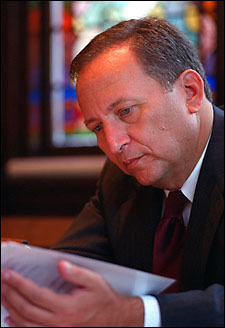
Also in this issue:
• Summers is remembered by many…
• A Summers timeline
Lawrence H. Summers announced on Feb. 21, 2006, that he will conclude his tenure as president of Harvard at the end of the 2005-2006 academic year. After a period of sabbatical and reflection, he will return to teaching and research as a University Professor.
During a dynamic and spirited presidency, Summers focused on laying the foundations for renewal that will be necessary to sustain Harvard’s excellence into the 21st century and beyond. Under his leadership, the University made numerous changes directed at providing the best educational experience for students across the University. His ambitious plans also encompassed significant growth in the faculties, the further internationalization of the Harvard experience, expanded efforts in and enhanced commitment to the sciences, and support for the humanities and the arts. Summers also spearheaded the effort to ensure that Harvard attract the strongest students regardless of financial circumstances. These ambitious initiatives were sustained in part by five years of extremely successful fundraising and an endowment that grew by well over 50 percent, providing the University with unprecedented resources.
“Working closely with all parts of the Harvard community, and especially with our remarkable students, has been one of the great joys of my professional life,” said Summers. “As I leave the presidency, my greatest hope is that the University will build on the important elements of renewal that we have begun over the last several years.”
“Since his appointment five years ago, Larry Summers has served Harvard with extraordinary vision and vitality,” said James R. Houghton, Senior Fellow of the Harvard Corporation, in a letter to the Harvard community regarding Summers’ resignation announcement. “He has brought to the leadership of the University a sense of bold aspiration and initiative, a prodigious intelligence, and an insistent devotion to maximizing Harvard’s contributions to the realm of ideas and to the larger world. Through his tenure as president, Harvard has both invigorated its academic programs and engaged more keenly with the complex challenges facing society.”
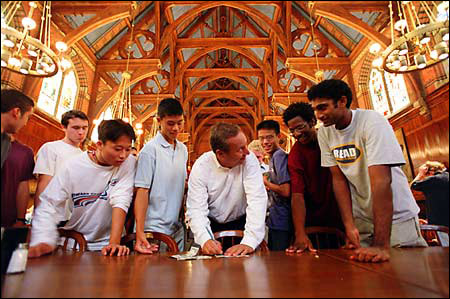
“Harvard’s greatness has always come from its ability to evolve as the world and its demands change – to educate and draw forth the energy of each successive generation in new and creative ways,” said Summers in the announcement of his decision to step down. “Believing deeply that complacency is among the greatest risks facing Harvard, I have sought for the last five years to prod and challenge the University to reach for the most ambitious goals in creative ways. There surely have been times when I could have done this in wiser or more respectful ways. My sense of urgency has stemmed from my conviction that Harvard has a special ability to make a real difference in a world desperately in need of wisdom of all kinds.”
Renewing the undergraduate experience: From the outset, Summers stressed the importance of providing Harvard undergraduates with an educational experience commensurate with their extraordinary talents and aspirations. Working with Faculty of Arts and Sciences (FAS) Dean William C. Kirby and Benedict H. Gross, dean of Harvard College, Summers called on FAS to begin a comprehensive review of every dimension of the College curriculum – from general education to pedagogy to education abroad to expository writing.
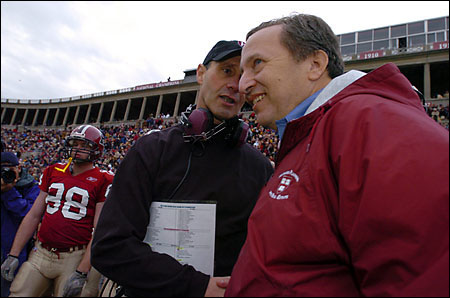
Although the review is still under way, a number of changes have already taken place including an increase in the number of freshman seminars (from 34 in 1998-99 to at least 141) and the creation of yearlong introductory course sequences in the life sciences and other fields that draw from multiple disciplines.
Summers worked throughout his tenure to find ways to increase student-faculty interaction, including teaching several courses himself. To bolster student-faculty interaction, the FAS, with support from the central administration, is in the midst of its first period of substantial growth in well over a generation. Since 1999, the faculty has added 100 members and is on the path to reach its goal of 750 “ladder” faculty by the end of 2010 and 800 by 2015.
Recognizing that students come to Harvard not just to develop academically but socially, Summers supported the efforts of the College to enhance the social and extracurricular time that students spend outside of the classroom. Addressing concerns that were raised during office hours, student surveys, and frequent visits to student Houses, Summers, with the leadership of the College and FAS, supported the creation of additional student space, was a proponent of building a student pub in Loker Commons, provided funding for a 24-hour library with a café, and supplied the financing necessary to improve student spaces in several of the Yard residences.
Expanding access to higher education – enhanced financial aid: Working closely with Dean of Admissions William R. Fitzsimmons, Summers’ created the Harvard Financial Aid Initiative (HFAI), one of his most prominent achievements. The initiative as announced eliminated family contributions for students from families with incomes less than $40,000, substantially strengthened recruitment efforts targeted at students from this income level, and established the Crimson Summer Academy for students from public and parochial schools in Boston and Cambridge. HFAI expanded this spring (2006) to eliminate family contributions for families with incomes less than $60,000 and reduce contributions for those earning between $60,000 and $80,000. The initiative refocused national attention on the enormous pressures that low- and middle-income families face in sending deserving students to America’s best universities and on the broader issue of equal opportunity. The program reaffirmed Harvard’s commitment to education as a source of opportunity and resulted in significant increases (more than 20 percent for the Class of 2009) in the economic diversity of the student body in the College.
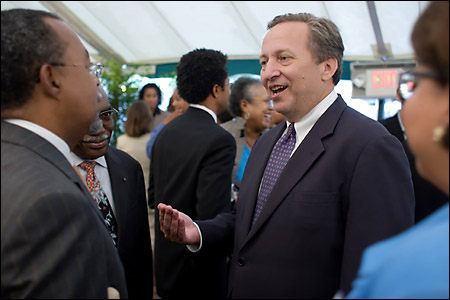
From his inaugural onwards, Summers stressed the importance of providing financial aid for graduate students in fields where the expected value to society is greatest. The Graduate School of Arts and Sciences now guarantees five years of financial support for all Ph.D. students, substantially increasing its competitiveness in attracting the best students. The Presidential Scholars Program was established to provide financial support to outstanding graduate students preparing for careers in public service or in the academic disciplines. To date, it has funded more than 100 students. The Summers administration also helped to create the Zuckerman and the Reynolds fellowship programs, which fund more than 40 students each year who are preparing for careers in social entrepreneurship and public leadership.
Commitment to science and technology: Throughout his presidency, Summers advocated energetically for strengthening Harvard’s intellectual and financial commitments in the sciences. He spoke frequently on the importance of ensuring that all who graduated from Harvard were equipped to comprehend, to master, and to work with the scientific developments that are transforming the world. With almost 1.5 million square feet of new science space planned or under construction, the University is making the commitment to realize this vision.
During Summers’ tenure, Harvard also made significant investments to expand the search for new knowledge at Harvard by developing strategic partnerships and launching initiatives such as:
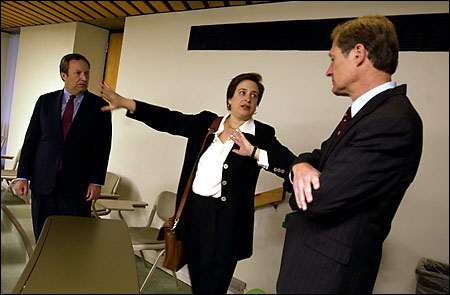
n the Harvard-MIT joint-effort Broad Institute – a collaborative venture with MIT and several affiliated hospitals, engaging more than 60 core and associate faculty members and their labs in harnessing the power of genomics to transform clinical medicine;
n the Harvard Stem Cell Institute – a cooperative effort among several Harvard Schools and hospitals, which has emerged as a leading national and international player at one of the most exciting frontiers in the life sciences; and
Summers speaks to parents of first-year students during Freshman Parents Weekend 2003. (Staff file photo Justin Ide/Harvard News Office)
n the Harvard Initiative for Global Health – a project joining experts in public health, medicine, and the social sciences to address challenges ranging from combating the spread of infectious diseases to developing more sophisticated metrics of population health to understanding the demography of aging.
Recognizing the profound importance of technology and applied sciences for every aspect of society, this year Harvard proposed plans to create its first new School in 35 years. The plans involve transforming the Division of Engineering and Applied Sciences into a school within FAS. The renaming will be presented for formal approval in autumn 2006.
Harvard in Allston: Summers recognized that Harvard’s future lay in part in the great opportunity presented by our Allston properties. In 2003, Summers laid out a preliminary vision for Harvard’s Allston enterprise focusing on encouraging new forms of collaboration across departments and faculties, the possibility of building state-of-the-art facilities for the Harvard Graduate School of Education and the Harvard School of Public Health, and creating additional graduate and undergraduate student and community housing. The following year, four faculty task forces comprising about 80 individuals from across the University, developed a series of programmatic options in four broad domains – science and technology, professional schools, undergraduate life, and Allston life with an emphasis on arts and culture.
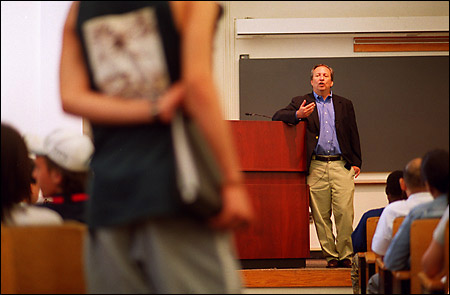
Over the past three years, the University has made steady progress and taken concrete steps toward realizing the promise presented by Allston. In autumn 2005, the University hired Christopher M. Gordon, formerly director of Capital Programs and Logan Modernization for the Massachusetts Port Authority, as chief operating officer of the Allston Development Group – a new Harvard organization with responsibility for physical planning, permitting, and the land development activities that flow from the academic and master planning processes. With plans securely in place and after extensive consultation with the Harvard community, the city of Boston, Harvard’s Allston neighbors, and others, the University announced its first projects earlier this year – a 500,000-square-foot science complex and interim facilities for arts and culture.
With the foundations laid over the course of the past few years and the very recent announcements of the selection of architects for the first building and new interim arts facilities, Harvard’s future in Allston is beginning to take shape and promises to strengthen the University for many decades and beyond.
Faculty growth, development, and diversity: In addition to the significant growth of the FAS, Summers saw the need to plan for a generational transition in Harvard’s faculties, most of which face numerous faculty retirements in the coming years. He recognized that family issues and growing competition from other universities would make it more challenging to recruit established scholars from elsewhere and called for an increased focus on the development of junior faculty at Harvard, who already perform a significant part of the University’s most important teaching and research.
Addressing the important role diversity and faculty development will play in maintaining the excellence of Harvard, the University created the senior leadership position of senior vice provost for faculty development and diversity and committed $50 million over the next decade to support initiatives aimed at increasing faculty excellence and diversity.
Expansion of Harvard’s global presence: While Harvard is known around the world, Summers focused on strengthening Harvard’s existing international relationships and fostering new ones. He traveled to China, India, Mexico, Chile, Brazil, and Europe to establish new programs, support the opening of Harvard centers abroad, recruit outstanding students, and explore new opportunities for collaboration.
At home, the University worked to broaden student exposure to non-Western cultures in art, music, literature, and social science courses. The University also created the position of vice provost for international affairs, expanded the African-American Studies Department to embrace African studies, and extended its network of area study programs. These initiatives ensure that today’s Harvard students will graduate with the greatest understanding of the developing world.
The University also embarked on a partnership with Google designed to make books in the Harvard library accessible and searchable everywhere on Earth via the Internet.
Summers was also a strong proponent of bringing international students to Harvard, stating, “Harvard must be a university that increasingly welcomes students from all over the world if it is to provide the best possible learning environment for American students, and if it is going to meet its obligations to the world.” To that end, he was also a prominent voice among those who lobbied successfully for the U.S. State Department to ease restrictions on foreign student visas.
Recognizing that Harvard plays an important role in promoting international understanding, Summers encouraged students and faculty to search for opportunities outside of the United States. His often-stated goal was that every undergraduate student should have an international experience before graduating. During his presidency, the number of undergraduates studying abroad nearly tripled. This year, the number of students who will have some kind of international experience – studying, conducting research, volunteering or interning – is expected to exceed 1,100, more than two-thirds of one Harvard College graduating class.
Summers was an energetic and forceful innovator and thinker with an abiding love for Harvard’s students as well as a deep respect for Harvard’s current and future contributions to the greater world. He believed strongly that Harvard was more than the sum of its parts and was focused on bringing together and leveraging all the resources of the University. His legacy will include an enlivened purposefulness of mission as Harvard enters the 21st century.
“President Summers has spurred attention to the importance of providing our undergraduates with an education fully worthy of their exceptional talents,” wrote Houghton in his letter to the Harvard community. “Through intensive planning for Harvard’s properties in Allston, as well as farsighted development of the University’s existing precincts, he has helped us imagine the shape of things to come, especially at the leading edge of scientific discovery. He has done all this with remarkable energy and intellectual acuity, and Harvard’s paths forward will long bear the imprint of his vision.”




